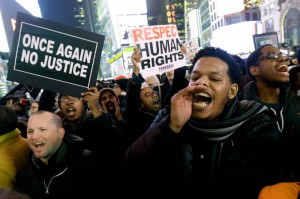Why Is It so Hard to Indict Cops?
With so many recent cases of white cop vs. black man, the country has erupted into protests demanding change. The George Zimmerman, Darren Wilson, Tamir Rice, and the Eric Garner case, have thrown the U.S. into a racial tailspin. These cases have all exemplified the complicated process of indicting cops.
 Why is it so hard for a grand jury to indict cops? When 90% of cases end in indictment, why do the majority of cop vs. citizen cases end in non-prosecution of the cop?
Why is it so hard for a grand jury to indict cops? When 90% of cases end in indictment, why do the majority of cop vs. citizen cases end in non-prosecution of the cop?
What Law Does the Grand Jury See?
Indicting a police officer is a far more complicated process than indicting a citizen. The primary reason is that the law is very generous in giving cops the authority to use deadly force.
For example, in the Ferguson case, Missouri law gives officers the right to use deadly force “in effecting an arrest or in preventing an escape from custody” if the officer reasonably believes the deadly force is necessary to “effect the arrest” and also he “reasonably believes that the person to be arrested has committed or attempted to commit a felony…or may otherwise endanger life or inflict serious physical injury unless arrested without delay.”
What Protects Cops from Indictment?
Major criminal cases use police investigators and detectives, which poses an extreme conflict of interest in cop cases. Police officers can also serve as eye witnesses, since they were often the only people there (or the only people who lived to testify about it). This massive conflict of interest can affect a prosecutor’s expectations of the cop’s involvement.
Cops enter into the law enforcement field knowing they need to protect their fellow colleagues at any cost. This is exemplified in the field, as well as the court.
Police also have an extensive amount of specific legal protection. Each state has guidelines for what protects its police, but the laws that allow the use of force are backed by the Supreme Court. Police can use force when resisted against, and will extend their use of force if the criminal does the same.
It’s crucial to remember that police officers must make immediate, instinctive decisions to stay alive. This fact that influence a grand jury’s determination as to whether the officer acted reasonably under the circumstances.
Even in times where racial tension is at a high, the majority of the population favors cops. There is a central knowledge and belief that cops are essential to the safety of our country. Some might say they are a necessary evil. Jurors are often asked to put themselves in the police officer’s shoes in these types of cases, rather than the criminals. This creates an even bigger push to side with the police.
Even when police officers are indicted, reports from Philadelphia and Seattle show that most of these cases become overturned. This is a direct cause of the substantial due process protection for police officers.
The criminal justice system is corrupted with racial discrimination. This has especially been prominent in cases such as Michael Brown and Eric Garner. But, it is key to remember that the criminal justice system is also a complicated one. Only experts can decide if an indictment is necessary. Hopefully, this article has shed some light onto the widespread unknown reasons why indicting a cop is so hard.


Comments
WHY DO…something now, that this country has not been doing from it’s very conception.
There has never been no value put on a black life, unless it can be $old on the auction block, and/or on a field of sports.
But that is just my point of view.
Shalom.